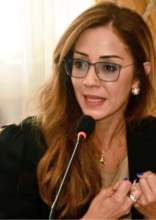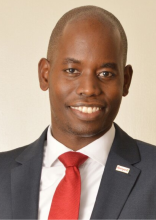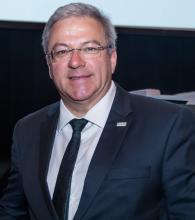SMP Advisory Group | January 25, 2023 | Zoom
Nor Yati Ahmad
Malaysia
Datuk Nor Yati Ahmad became a member of the International Public Sector Accounting Standard Board in January 2023.
Datuk Nor Yati Ahmad is a former Accountant General of Malaysia. She retired from the service on September 2025 and has served in various departments in state and federal level in the last 30 years of service. She was conferred the National Service Medal by Duli Yang Maha Mulia Yang Dipertuan Agong the Ruler of Malaysia for the service. She is a member of Malaysia Institute of Accountant (MIA) and Fellow Certified Practising Accountant (FCPA) Australia. She is also a council member of Malaysia Institute of Certified Public Accountants and is being appointed as Adjunct Professor at Universiti Teknologi MARA (UiTM).
Throughout her career, she has actively contributed to various professional committees and task force, particularly in the development of accounting standards. She was a member of Government Accounting Standard Advisory Committee under the Accountant General’s Department which issues Malaysian Public Sector Standard (MPSAS). She was a chairman of Public Sector Accounting Committee of Malaysian Institute of Accountant and Islamic Accounting Standards Advisory Committee which issues Islamic Accounting Standard for Baitulmal, Zakat and Waqf. She also was served as board member in several statutory bodies and Malaysian Government-Linked Companies (GLCs).
She holds a Bachelor of Accounting from University Putra Malaysia and a Master of Accountancy and Finance from University of Adelaide.
Her Technical Advisor is Rasmimi Ramli.
Greg Schollum
New Zealand
Greg Schollum joined the IAASB in January 2023 after being nominated by the External Reporting Board of New Zealand.
Mr. Schollum was the Deputy Controller and Auditor-General of New Zealand, a position he held for seven years. Thirty-four of his 42-year career has involved him in an audit capacity in both the public and private sectors. He has served on standard-setting boards in New Zealand and internationally, including serving for five years on the International Public Sector Accounting Standards Board.
Mr. Schollum graduated with a Bachelor of Management Studies (Major in Accounting) from the University of Waikato, New Zealand.

Neil Morris
South Africa
Neil Morris became a member of the IAASB in January 2023. He was nominated by the Transnational Auditors Committee.
Mr. Morris is currently the Global Head of Assurance and ESG Methodology at KPMG. He is a Chartered Accountant and has 24 years' experience with KPMG in South Africa and the United Kingdom. His work experience includes risk management, climate change and sustainability, financial audit, and assurance technical support.
Mr. Morris is a member of the South African Institute of Chartered Accountants (SAICA) and a Registered Auditor with the South African Independent Regulatory Board for Auditors (IRBA). He has served on various committees and working groups for both SAICA and the IRBA.
Mr. Morris has a Bachelor of Commerce in Accounting from the University of Cape Town and a Bachelor of Commerce Honours in Accounting from the University of KwaZulu-Natal.

Rania Uwaydah Mardini
Senior Lecturer
Lebanon
Ms. Uwaydah Mardini is a Senior Lecturer at the Olayan School of Business at the American University of Beirut (AUB) and an advisor to the United Nations Development Programme (UNDP's) Regional Bureau for Arab States. She has served as a consultant to the UNDP’s Anti-Corruption and Integrity in the Arab Countries (ACIAC) program. She started her career in assurance at Ernst & Young (EY), Beirut office.
Ms. Uwaydah Mardini served as a member of the International Federation of Accountant’s (IFAC’s) International Panel on Accountancy Education (2019-2022) and its International Accounting Education Standards Board (2017-2019) and chaired the latter's Public Sector Accounting, Reporting, and Assurance Task Force. Additionally, between 2013 and 2020, she was heavily engaged with the Lebanese Transparency Association, the Lebanese chapter of Transparency International, as an Audit Committee Member, its Treasurer, and finally its Vice Chairperson.
Ms. Uwaydah Mardini holds a BBA (with Distinction, 1996) and an MBA in Finance (1999) from AUB. She is a CPA licensed in California and Lebanon, and is certified in public financial management, fraud examination, and corporate governance.
She became a member of the International Ethics Standards Board for Accountants (IESBA) in January 2023.

Paul Muthaura
Kenya
Paul Muthaura became an independent member of the IESBA in January 2023.
Mr. Muthaura is an independent consultant supporting on one hand, the development of capital markets in emerging African jurisdictions; On the other hand, he drives the twinning of realizable transitions to greater resilience, inclusion and carbon neutrality with the stimulation of economic value in developing economies. He is the Africa Chair for the Impact Infrastructure Commission; a Board Member of ICEA LION Asset Management; an Independent Member of the Financial Sector Deepening Trust, Kenya; and a Member of the Securities Advisory Board of the Toronto Centre for Global Leadership in Financial Supervision.
Mr. Muthaura has previously been the Chief Executive Officer of ICEA LION General Insurance Kenya, the first African member of the Financial Stability Board TCFD insurer pilot group. Prior to that, he was the Chief Executive of the Capital Markets Authority of Kenya. In his term at CMA, he was the Africa and Middle East Regional Committee Chair on the Board of the International Organization of Securities Commissions (IOSCO); Chairman of the Consultative Committee of the East African Securities Regulatory Authorities; and a member of the Financial Stability Board (FSB) Regional Consultative Group for Sub-Saharan Africa.

Francisco A.M. Sant'Anna
Brazil
Francisco Sant'Anna became IFAC Board member in November 2022, nominated by the Institute of Independent Auditors of Brazil and the Federal Council of Accountants of Brazil.
Mr. Sant'Anna is the Chairman of the Board of IBRACON. He is a retired audit partner of Deloitte Brazil. He is also a past president of IBRACON, a Board member of Deloitte Brazil, and the Regulatory Leader and Public Policy Leader of Deloitte Brazil.
Mr. Sant'Anna has a degree in accounting.

Sidharta Utama
Indonesia
Professor Sidharta Utama joined the IFAC Board in November 2022, nominated by the Institute of Indonesia Chartered Accountants (IAI).
He is a professor of Accounting at Universitas Indonesia (UI). He serves as an independent commissioner, chair and member of audit committee in a number of listed companies. He is the chair of the advisory board of the Indonesia Institute for Corporate Directorship and the secretary of the National Committee on Governance Policy, Coordinating Ministry for Economic Affairs. He has been the vice rector on finance and general affairs at UI and the chairman of the Indonesia Commodity Futures Trading Regulatory Agency.
Prof. Utama serves as a member of IAI National Council, the oversight board at the Indonesian Institute of Chartered Public Accountants, the steering committee on Financial Accounting policy of the central bank, and the Committee on Public Accountant Profession, Ministry of Finance. He represents IAI as the council member of ASEAN Federation of Accountants. He was also a member of the International Accounting Education Standards Board and the Indonesian Accounting Standards Board.
Prof. Utama obtained his undergraduate degree in accounting from UI, MBA in finance and information system from Indiana University, and PhD in accounting from Texas A&M university. He is a Chartered Accountant and Chartered Financial Analyst and has published research papers in accounting, corporate governance, and finance.

